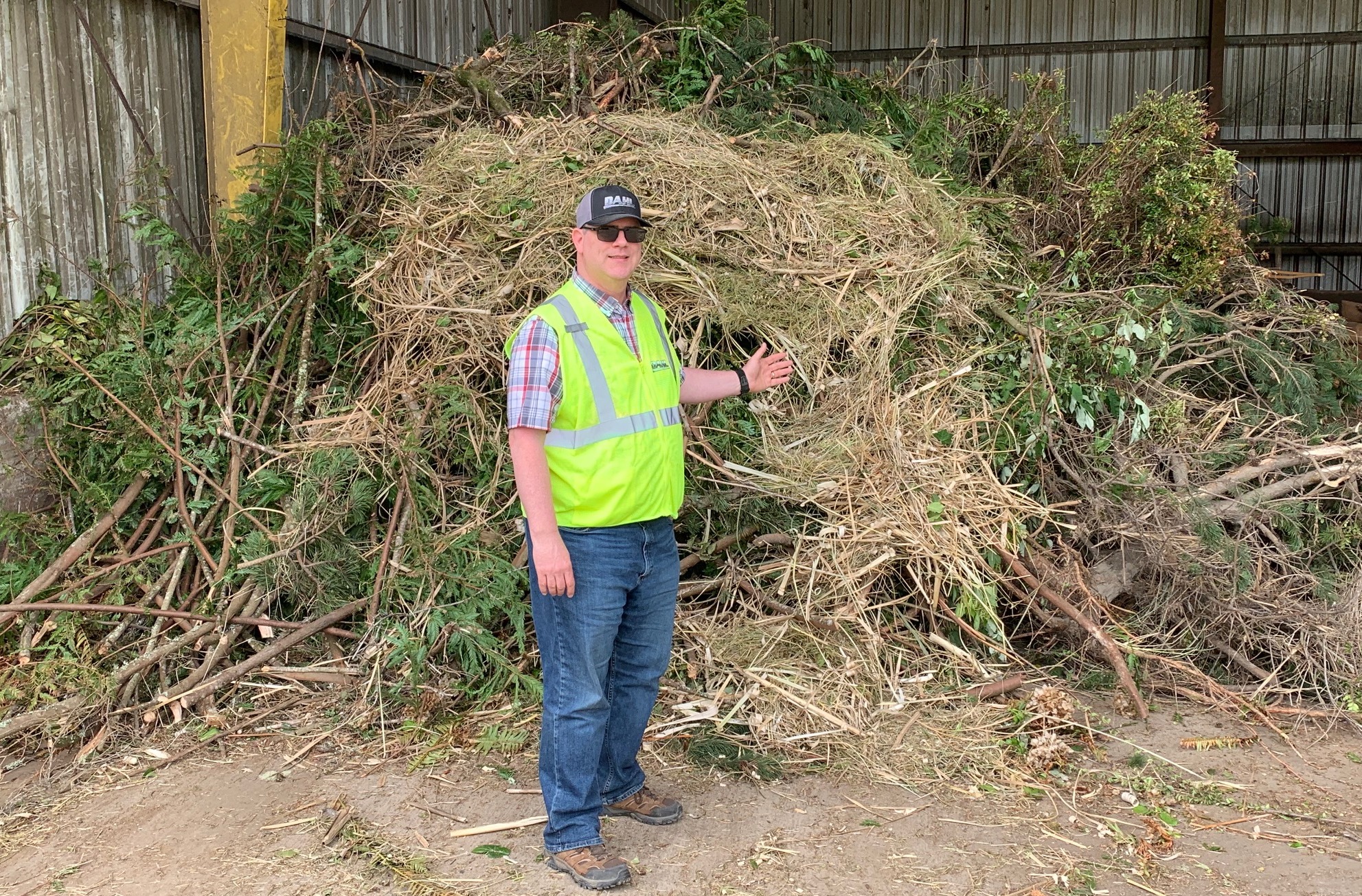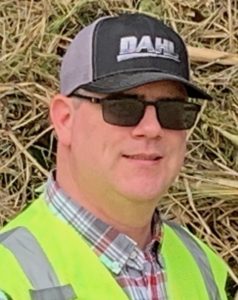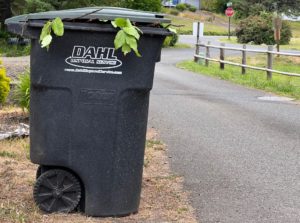
By GARRET JAROS/YachatsNews
Customers of Dahl Disposal Service will have the option to recycle food-waste with yard debris this fall — but rates will increase starting next week.
The Toledo-based company, which has 7,500 customers in Yachats, Waldport, Siletz, Toledo and unincorporated Lincoln County, joins the two other county sanitation companies that already offer curbside-collection of food scraps with yard debris in what is called “mixed compostables.”
Customers will have the option of adding fruits and vegetables, meat, bones, crab shells, dairy products and even paper-napkins and paper-towels into yard-debris roll-carts.

“We are doing it to keep more material out of landfills, giving it a second chance,” said Dahl outreach manager Dave Larmouth. “We also want to align our program with what other haulers in Lincoln County are doing.”
Dahl customers will also see a rate increase on their July bills.
Waldport residents will see an increase of 8.4 percent, Yachats 9.18 percent and unincorporated areas of Lincoln County 4.5 percent. Rates are reviewed annually. In 2004 the state mandated that cities have agreements with solid waste haulers to keep them solvent.
Although counties and municipalities must approve rate increases, which are based on a percentage formula that accounts for increased costs to haulers, the annual review and any rate adjustments are pro forma.
“This is an unusual part or our ordinances,” Yachats mayor Craig Berdie said during a presentation by Larmouth at a June 14 city council meeting.
The Yachats council approved the increase as have the Waldport council and county commissioners.
The rise in rates is primarily due to a 4 percent wage increase for Dahl employees, along with retention raises and the addition of an employee to account for family leave. Only a half percent of the increase comes from the addition of the food waste program.
Heading to Corvallis
Dahl currently takes yard debris to Eugene, but with the addition of food scraps the material must go to Pacific Region Compost just north of Corvallis, which charges more. Pacific Compost is across the road from Coffin Butte Landfill where all three county haulers dump trash. Both the landfill and Pacific Compost are owned by Republic Services.

Pacific processes more than 100,000 tons of residential yard debris and residential and commercial food waste each year to produce a compost used for agricultural, landscaping and gardening, which it then sells. It is the largest operation of its kind between Seattle and San Francisco.
Transforming mixed compostables into saleable compost takes six to nine months depending on the season. The process slows during colder months. The manpower, water, space and equipment needed to actively manage the compost, which must be turned and monitored for temperature and moisture accounts for the additional cost to haulers.
Thompson’s Sanitary Service, which serves Newport and has 4,000 customers, rolled out its mixed-compostables program in 2015. North Lincoln Sanitary Service, which covers Lincoln City and has 8,000 residential and 800 commercial customers, began its program in 2021.
“If it grows it goes,” said Aimee Thompson of Thompson’s sanitary, who explained it is a statewide future goal put forth by the governor, to divert 50 percent of the waste that currently ends up in landfills. “Lincoln County still has a way to go on that, but diverting food waste and yard waste is a good way to start.”
Thompson’s rolled out the collection of food waste at the same time it began offering yard debris pickup. The combination meant the company had to purchase new carts and a new truck. Neither is the case for Dahl.
“The biggest challenge is keeping contamination out of the mix,” Thompson said. “And the biggest culprit is plastics. Otherwise, it’s just a matter of people getting used to the added service. We still are trying to encourage people to put food waste in there because a lot of people don’t like the ick part of it.”
Most customers who use the mixed-compost option store the food scraps in a bucket in their kitchen and then mix it with the yard debris prior to pick up. There are several sizes and types of food-scrap buckets on the market, including some with charcoal filters. Thompson’s encourages people to layer the combination inside the carts.
“So put yard waste, then food waste, then yard waste because it will keep your cart cleaner because the yard waste will kind of clean it as it’s dumped,” Thompson said. “Some people like to freeze theirs and then just dump it on their service day so it’s not as gross.”
Toledo transfer station
All mixed compostables Dahl collects will be handled at a transfer station in Toledo.
“We have to stay on top of it as it comes in because we can’t stockpile it like we do yard debris because it rots,” Larmouth said. “All of the rules about how you manage a transfer are based on things that rot. So this food waste has those same rules.”
Like Thompson, Larmouth said the biggest challenge is avoiding contamination.
“There are a lot of products on the market that claim to be compostable,” he said. “Everything from bowls and plates to cups, utensils and some to-go containers. But the compost facility has told us that they can’t process those reliably in the time they work up the compost. When they go to screen the compost, those things aren’t broken down well enough yet.”
Another culprit are bags that some people use to line compost buckets which they believe are compostable but are not.
The mixed compostables programs at Thompson’s and North Lincoln Sanitary have been popular with customers. The current use rate for Thompson’s is 88 percent, while North Lincoln touts about 80 percent participation.
“The biggest challenge is getting education out there,” said Tina French, president of North Lincoln. “But the people that were reluctant to participate in the beginning, once they see their neighbors using it, a lot of them come around and are like ‘Okay bring us the cart back, we’ll use it.’ ”
- Garret Jaros is YachatsNews’ full-time reporter and can be reached at GJaros@YachatsNews.com
Rates beginning July 1
Dahl Disposal Service: Waldport: 35-gallon — $38.95; 65-gallon — $65.15; Yachats: 35-gallon — $39.05; 65-gallon — $65.40; county: 35-gallon — $40.55; 65-gallon — $69.75.
North Lincoln Sanitary Service: Lincoln City: 32 gallon — $32.93; 64-gallon — $48.66.
Thompson’s Sanitary Service: Newport: 35-gallon — $40.95; 65-gallon — $71.25; county: 35-gallon — $47.60; 65-gallon — $82.50.




Thank you for publishing the new rates in other parts of Lincoln County.
Dropped them after a few months of living here because they refuse to recycle glass and charge too much.
For $11 I take all my trash over to Florence and can recycle all my glass and get a discount for that and my age. Much better deal than Dahl.